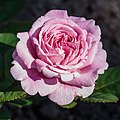Rosa 'Double Delight'
Rosa 'Double Delight' | |
|---|---|
 | |
| Hybrid parentage | Rosa 'Granada' × Rosa 'Garden Party' |
| Cultivar group | Hybrid Tea |
| Cultivar | 'Double Delight' |
| Marketing names | Rosa 'ANDeli' |
| Breeder | Swim & Ellis |
| Origin | United States, 1977 |
| Wikimedia Commons has media related to Rosa 'Double Delight'. |
'Double Delight' (syn. 'ANDeli') is a hybrid tea rose cultivar bred by Swim & Ellis and introduced in 1977. Its parents were two hybrid tea cultivars – the red and yellow 'Granada' (Lindquist, 1963) and the ivory 'Garden Party' (Swim, 1959).
The large, strongly fragrant red and white flowers have a high-centered bloom form and appear continuously throughout the season. They are double, have a diameter of more than 10 cm (4") and up to 30 petals. In the sun, their colour changes from white to carmine red, beginning at the edges. The change is therefore more pronounced in warmer, sunnier regions and is absent in greenhouses due to the UV filtering of glass.
The plant has large, medium green foliage, grows about 90 to 150 cm (3' to 5') high,[1] and 60 centimetres (2.0 ft) wide.[2] It is winter hardy up to −25 °C (USDA zone 5), but can be susceptible to mildew and black spot. The cultivar needs sunny, warm places, but can be grown in containers.[2] 'Double Delight' is used as garden rose and as cut flower.
Awards
'Double Delight' was granted several awards, such as gold medals in Baden-Baden and Rome in 1976, fragrance awards in Geneva (1976), and the inclusion in the All-American-Rose-Selection in 1977.[3] In 1985, the cultivar was inducted into the Rose Hall of Fame.[4]
References
^ "'Double Delight' rose Description". HelpMeFind. Retrieved 2014-09-02..mw-parser-output cite.citation{font-style:inherit}.mw-parser-output .citation q{quotes:"""""""'""'"}.mw-parser-output .citation .cs1-lock-free a{background:url("//upload.wikimedia.org/wikipedia/commons/thumb/6/65/Lock-green.svg/9px-Lock-green.svg.png")no-repeat;background-position:right .1em center}.mw-parser-output .citation .cs1-lock-limited a,.mw-parser-output .citation .cs1-lock-registration a{background:url("//upload.wikimedia.org/wikipedia/commons/thumb/d/d6/Lock-gray-alt-2.svg/9px-Lock-gray-alt-2.svg.png")no-repeat;background-position:right .1em center}.mw-parser-output .citation .cs1-lock-subscription a{background:url("//upload.wikimedia.org/wikipedia/commons/thumb/a/aa/Lock-red-alt-2.svg/9px-Lock-red-alt-2.svg.png")no-repeat;background-position:right .1em center}.mw-parser-output .cs1-subscription,.mw-parser-output .cs1-registration{color:#555}.mw-parser-output .cs1-subscription span,.mw-parser-output .cs1-registration span{border-bottom:1px dotted;cursor:help}.mw-parser-output .cs1-ws-icon a{background:url("//upload.wikimedia.org/wikipedia/commons/thumb/4/4c/Wikisource-logo.svg/12px-Wikisource-logo.svg.png")no-repeat;background-position:right .1em center}.mw-parser-output code.cs1-code{color:inherit;background:inherit;border:inherit;padding:inherit}.mw-parser-output .cs1-hidden-error{display:none;font-size:100%}.mw-parser-output .cs1-visible-error{font-size:100%}.mw-parser-output .cs1-maint{display:none;color:#33aa33;margin-left:0.3em}.mw-parser-output .cs1-subscription,.mw-parser-output .cs1-registration,.mw-parser-output .cs1-format{font-size:95%}.mw-parser-output .cs1-kern-left,.mw-parser-output .cs1-kern-wl-left{padding-left:0.2em}.mw-parser-output .cs1-kern-right,.mw-parser-output .cs1-kern-wl-right{padding-right:0.2em}
^ ab Peter Beales (2002). Klassische Rosen [Classic roses] (in German). DuMont. p. 422. ISBN 3-8320-8736-2.
^ "'Double Delight' rose Awards". HelpMeFind. Retrieved 2014-09-02.
^ "'Double Delight'". World Federation of Rose Societies. 2009-06-03. Retrieved 2014-09-02.
